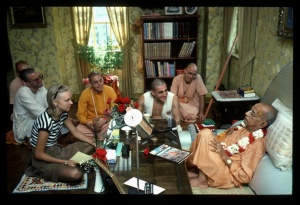SB 5.17.14

A.C. Bhaktivedanta Swami Prabhupada
TEXT 14
- navasv api varṣeṣu bhagavān nārāyaṇo mahā-puruṣaḥ puruṣāṇāṁ
- tad-anugrahāyātma-tattva-vyūhenātmanādyāpi sannidhīyate
SYNONYMS
navasu — in the nine; api — certainly; varṣeṣu — tracts of land known as varṣas; bhagavān — the Supreme Personality of Godhead; nārāyaṇaḥ — Lord Viṣṇu; mahā-puruṣaḥ — the Supreme Person; puruṣāṇām — unto His various devotees; tat-anugrahāya — to show His mercy; ātma-tattva-vyūhena — by expansions of Himself in the quadruple forms Vāsudeva, Saṅkarṣaṇa, Pradyumna and Aniruddha; ātmanā — personally; adya api — until now; sannidhīyate — is near the devotees for accepting their services.
TRANSLATION
To show mercy to His devotees in each of these nine tracts of land, the Supreme Personality of Godhead known as Nārāyaṇa expands Himself in His quadruple principles of Vāsudeva, Saṅkarṣaṇa, Pradyumna and Aniruddha. In this way He remains near His devotees to accept their service.
PURPORT
In this connection, Viśvanātha Cakravartī Ṭhākura informs us that the demigods worship the Supreme Lord in His various Deity forms (arcā-vigraha) because except in the spiritual world, the Supreme Personality of Godhead cannot be directly worshiped in person. In the material world, the Lord is always worshiped as the arcā-vigraha, or Deity in the temple. There is no difference between the arcā-vigraha and the original person, and therefore those who are engaged in worshiping the Deity in the temple in full opulence, even on this planet, should be understood to be directly in touch with the Supreme Personality of Godhead without a doubt. As enjoined in the śāstras, arcye viṣṇau śilā-dhīr guruṣu nara-matiḥ: "No one should treat the Deity in the temple as stone or metal, nor should one think that the spiritual master is an ordinary human being." One should strictly follow this śāstric injunction and worship the Deity, the Supreme Personality of Godhead, without offenses. The spiritual master is the direct representative of the Lord, and no one should consider him an ordinary human being. By avoiding offenses against the Deity and the spiritual master, one can advance in spiritual life, or Kṛṣṇa consciousness.
In this regard, the following quotation appears in the Laghu-bhāgavatāmṛta:
- pādme tu parama-vyomnaḥ
- pūrvādye dik-catuṣṭaye
- vāsudevādayo vyūhaś
- catvāraḥ kathitāḥ kramāt
- tathā pāda-vibhūtau ca
- nivasanti kramādi me
- jalāvṛti-stha-vaikuṇṭha-
- sthita vedavatī-pure
- satyordhve vaiṣṇave loke
- nityākhye dvārakā-pure
- śuddhodād uttare śveta-
- dvīpe cairāvatī-pure''
- kṣīrāmbudhi-sthitānte
- kroḍa-paryaṅka-dhāmani
- sātvatīye kvacit tantre
- nava vyūhāḥ prakīrtitāḥ
- catvāro vāsudevādyā
- nārāyaṇa-nṛsiṁhakau
- hayagrīvo mahā-kroḍo
- brahmā ceti navoditāḥ
- tatra brahmā tu vijñeyaḥ
- pūrvokta-vidhayā hariḥ
"In the Padma Purāṇa it is said that in the spiritual world the Lord personally expands in all directions and is worshiped as Vāsudeva, Saṅkarṣaṇa, Pradyumna and Aniruddha. The same God is represented by the Deity in this material world, which is only one quarter of His creation. Vāsudeva, Saṅkarṣaṇa, Pradyumna and Aniruddha are also present in the four directions of this material world. There is a Vaikuṇṭhaloka covered with water in this material world, and on that planet is a place called Vedavatī, where Vāsudeva is located. Another planet known as Viṣṇuloka is situated above Satyaloka, and there Saṅkarṣaṇa is present. Similarly, in Dvārakā-purī, Pradyumna is the predominator. On the island known as Śvetadvīpa, there is an ocean of milk, and in the midst of that ocean is a place called Airāvatī-pura, where Aniruddha lies on Ananta. In some of the sātvata-tantras, there is a description of the nine varṣas and the predominating Deity worshiped in each: (1) Vāsudeva, (2) Saṅkarṣaṇa, (3) Pradyumna, (4) Aniruddha, (5) Nārāyaṇa, (6) Nṛsiṁha, (7) Hayagrīva, (8) Mahāvarāha, and (9) Brahmā. "The Lord Brahmā mentioned in this connection is the Supreme Personality of Godhead. When there is no fit human being to empower as Lord Brahmā, the Lord Himself takes the position of Lord Brahmā. Tatra brahmā tu vijñeyaḥ pūrvokta-vidhayā hariḥ. That Brahmā mentioned here is Hari Himself.